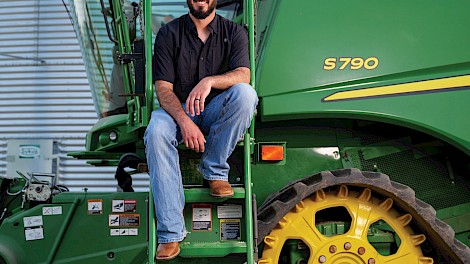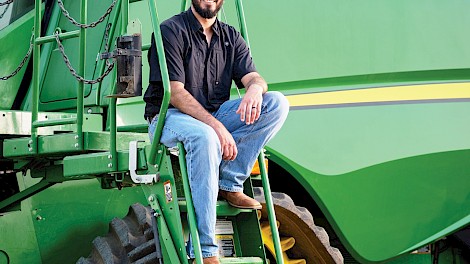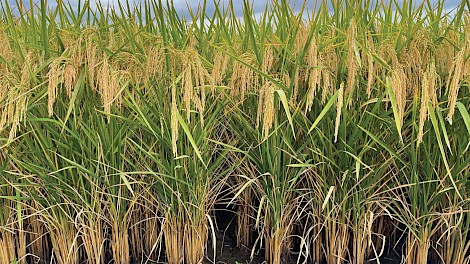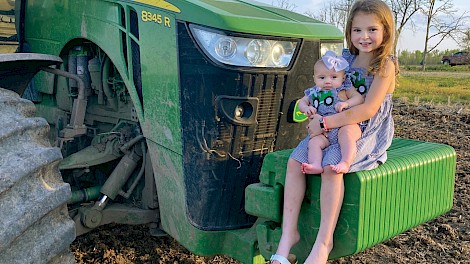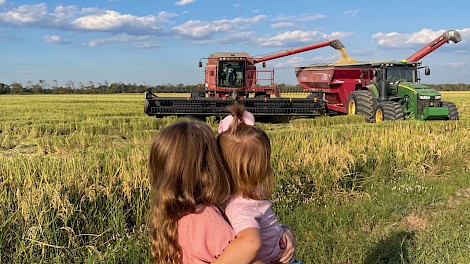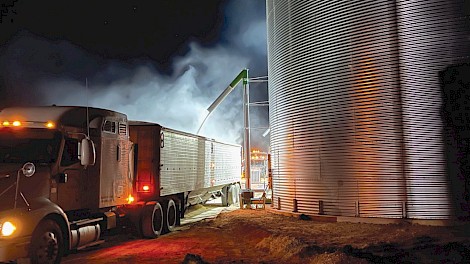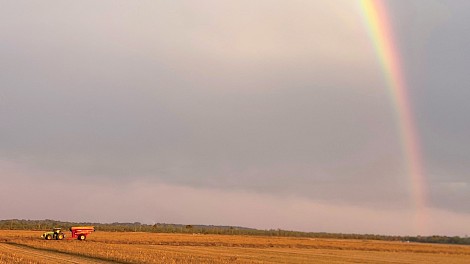An Organically Grown Life
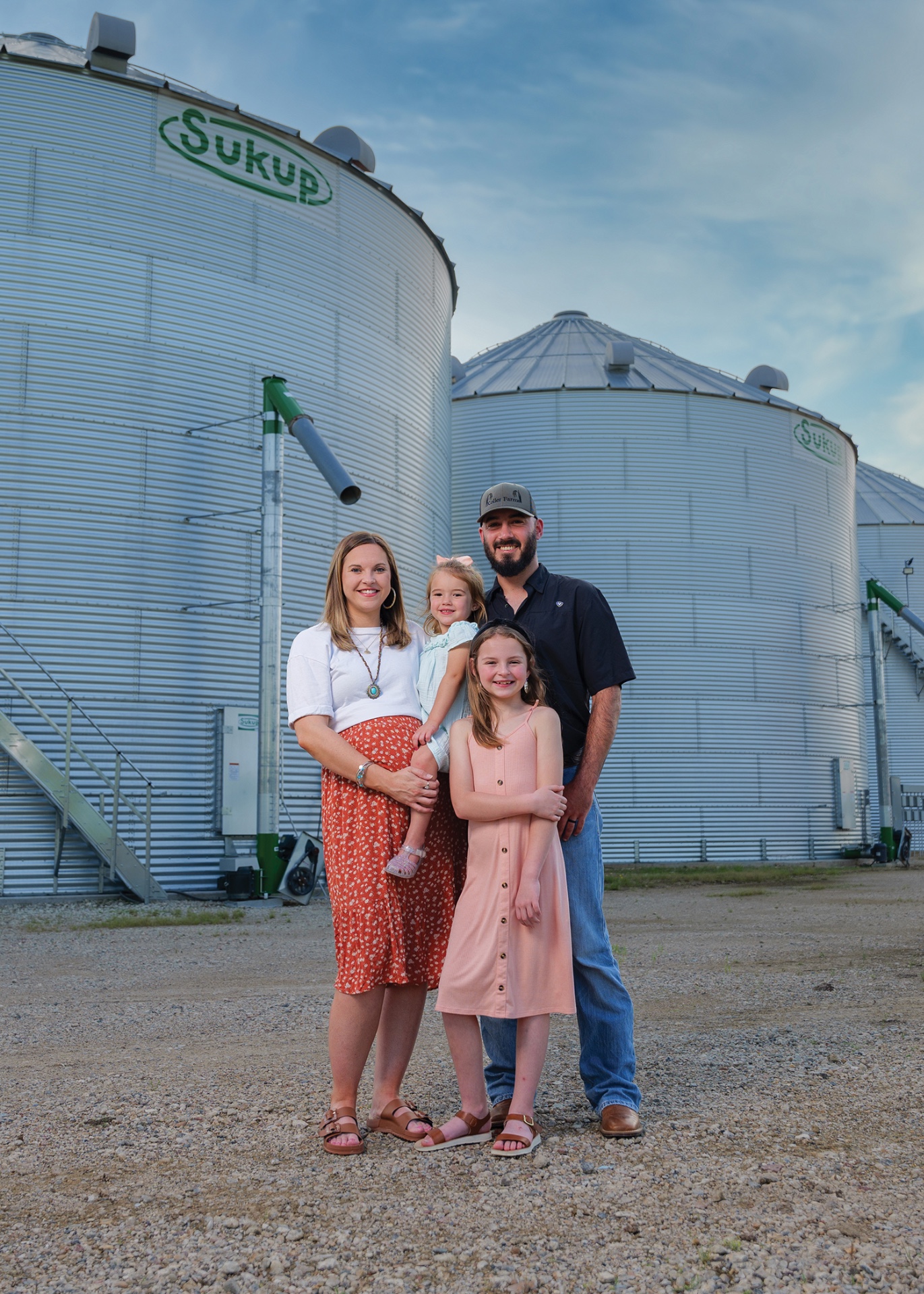
Biology, chemistry, math, mechanics, business, and engineering…
When considering the experts in these fields, we often overlook farmers whose grasp of each must be extensive. It is a career, or even more accurately, a lifestyle requiring a firm grip on many complex subjects, including these and others. Going to work each day, facing weather uncertainties, devouring pests, soil conditions, and the potential breakdown of complex machinery, acts as the most advanced, and sometimes severe form of continuing education. Add to all of this the reality that farming is a job that is extremely physically demanding and requires strength, stamina, a strong work ethic, and problem-solving, and you quickly realize the resume requirements of a farmer narrow the field of qualified applicants down to an impressive few.
Often, when looking at those who possess the appropriate skill set, you will find they have been preparing for the role their entire life. Sometimes, farming is passed down from generation to generation. Or sometimes, like in the case of Zach Koller, it becomes a life born a little more organically out of a love of the outdoors and an unyielding and determined willingness to work hard and take no shortcuts. Koller started working big jobs while most kids his age were still riding bikes and wasting time with friends. Thanks to his mother, Rachel Scott, who had high expectations and the right connections, Koller found his way into what has now become his passion.
“One of my biggest inspirations in life is Brendon Burrell,” Koller said. “When I was 14 years old, we attended the same church, and my mom wanted to show me what hard work was to prepare me for my future.” “From a young age, Zach always loved being outside,” said Scott. “When he had the opportunity to work with Brendon, I thought, ‘Great! A little manual labor will help encourage him to go to college.’ But he fell in love with the land and the work.”
Scott’s introduction of her son to Burrell set Koller on a path none of the three could have predicted would be so defining for his future. “Brendon managed a hunting club and gave me the opportunity to work summers and weekends. He taught me how to run farm equipment, grow food plots, and manage moist soil units. Brendon instilled a hard work ethic in me from a young age,” he said, and it’s that work ethic that has continued to lead Koller from one opportunity to the next. “Zach is such a great person with a wonderful family!” expressed Burrell. “He came to work for me pretty young. He showed up to work every time I asked. I was so lucky to have him working for me because of his strong work ethic and his willingness to help with whatever I needed… I know a lot of people, but very few I feel blessed to know. Zach, I feel blessed to know!”
It was Burrell whose referral secured Koller’s second job when he was just 16 years old. “Brendon knew I always needed young men from the community to work in the heat of the summer. So, the introduction was a blessing,” said Koller’s second boss, Cole Law. “Cole taught me everything I needed to know about mixing chemicals and fertilizers, and he taught me how to drive a standard,” said Koller. “In agriculture, in the heat of the summer, you find out who the wannabes and the real workers are. Zach never complained,” bragged Law. “I told him afterward, ‘Brother you’ve got it! You can make it in ag.’ I’m just so proud of that young man. I can’t say enough. He could handle 100-hour work weeks, and he never complained. I just love that guy so much. From day one, I was like, ‘This kid is something special.’ He listens, learns, and does what he says he’s going to do. He’s just special. My business was better off because of him.”
“My time with Cole further fueled my love for hard work,” claims Koller, and these valuable lessons propelled him through the next couple of years, culminating in landing his third job, his senior year of high school. That year, he worked for a local farmer who farmed thousands of acres. “There I was taught the process of planting, growing, and harvesting,” recalls Koller. “I was in DECA at Arkansas High and would leave school after lunch to head to the farm and would be on a tractor harvesting wheat until midnight or later, most nights.”
After graduating from Arkansas High School, Koller set out to lineman school at Texas State Technical College in Marshall, Texas. His prior job experience made a way for him, and he was contacted to help upkeep a few thousand acres of hunting ground while he put himself through the training. After completing the program, he moved to Round Rock, Texas, to work as an apprentice lineman, but that adventure was short-lived. “After a few months, I was given the job opportunity to take a managing position for Big Woods Hunting Club back home in Texarkana.” He gladly jumped on the opportunity, and that has been his primary job since 2017.
In his current position, Koller oversees the wildlife and habitat management on several thousand acres of privately owned wetland reserve program. “I maximize food for waterfowl on our property by growing different strains of millets, milo, sunflowers, and moist soil vegetation, which consists of monitored water drawdowns, spraying for invasive plant species, and also pest species,” he explained. “I work with Ducks Unlimited and also the University of Arkansas at Monticello for research on waterfowl. I also get to work with and be consulted by the best wildlife management developers in the states.” And after growing up hunting and fishing with his dad, uncles, and cousins, he also enjoys some of the other perks that come with the job. “I also get to enjoy participating in the hunting and meeting of different guests that are invited on our hunts.” It’s the perfect position and one he’s unknowingly been preparing for since he was a teen.
Additionally, Koller leases roughly 900 acres of farmland and has used it to start what he calls his “side business,” which is now Koller Farms LLC. As a first-generation farmer, he spent 2018 and 2019 developing the previously neglected farmland, preparing it for planting and has grown rice and soybeans every year since 2020. He continues to purchase more equipment each year to expand his business.
With a career path that inevitably morphs from a job to a way of life, it takes a supportive team to make it all work. Koller has that support from his beautiful, expanding family. His wife, Madison is a nurse and works for CHRISTUS St. Michael Hospital. “Zach is the most hardworking man I know,” she said, “and he gives 110 percent in everything he does. I love that our kids get to be raised on the farm and see firsthand the outcome of hard work. Being married to a farmer can be challenging because of the long hours. Some days, it means packing up food and the kids and heading to the fields so we can eat dinner with dad.”
The couple has two daughters, Maisyn, who is nine, and Whitley, who is three, and they are also expecting their first son, who is due in July. “My girls aren’t old enough yet to be my farm hands,” Koller said, “but they love to ride the tractor with me, scouting and checking the crop fields.” “My wife has chickens and a garden, so that keeps the girls busy on the land as well.” And the support doesn’t stop there. “My mom also plays a huge part in keeping my business running. She keeps all of my books and finances organized.” A role in fulfilling her son’s dreams is one Rachel Scott feels honored to have. “I’m just so blessed to have the opportunity to help him do exactly what he loves to do,” she said.
The nine-to-five concept of what a typical work week looks like for most Americans is out the window for the average farmer. “There is no ‘typical day’ out here on the farm,” explains Koller. “Every day presents a new challenge for which I have to find a solution. There are many things that can change what the day will bring—the season that we are in, weather, and equipment. The most difficult aspect of farm life is working 100-hour weeks, and mother nature can always make or break your business every single year.”
But to farmers across the nation, all the unknowns and risks are worth it. There is so much satisfaction in seeing the fruit of your labor springing to life down each carefully constructed row and the life represented by each beautiful green field. “The most satisfying part of being a farmer is planting the crops and watching them grow. It can be rewarding and fulfilling. I hope to be able to raise my kids with the same heart for hunting and farming and instill the hard work ethic in them to one day be successful,” said Koller. “I’m hopeful to be farming for as long as God’s plan allows it.”

